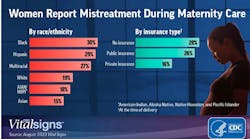One in five women reported mistreatment while receiving maternity care
Twenty percent of women surveyed reported experiences of mistreatment during pregnancy and delivery care, according to a new CDC Vital Signs report. Mistreatment during maternity care was higher among Black (30%), Hispanic (29%), and multiracial (27%) women.
Women with no insurance (28%) or public insurance (26%) at the time of delivery experienced more mistreatment during maternity care than women with private insurance (16%).
The most common types of mistreatments reported were:
- Receiving no response to requests for help
- Being shouted at or scolded
- Not having their physical privacy protected
- Being threatened with withholding treatment or made to accept unwanted treatment
CDC analyzed data from the Porter Novelli View Moms survey administered in English from April 24-30, 2023, to examine components of respectful care. While most of the 2,402 survey respondents reported overall satisfaction with the maternity care they received, satisfaction was lower among those who experienced mistreatment.
Twenty-nine percent of women reported discrimination during maternity care. The most common reasons for reported discrimination were age, weight, and income and varied by race/ethnicity.
Black (40%), multiracial (39%), and Hispanic (37%) women reported the highest rates of discrimination. Experiences of racial discrimination have previously been associated with pregnancy complications.
Nearly half (45%) of women reported holding back from asking questions or discussing concerns with their provider during maternity care. The most common reasons included:
- Thinking, or being told by friends or family, what they were feeling was normal
- Not wanting to make a big deal about it or being embarrassed to talk about it
- Thinking their healthcare provider would think they’re being difficult
- Thinking their healthcare provider seemed rushed
- Not feeling confident that they knew what they were talking about
CDC’s Hear Her campaign has resources for providers and for pregnant and postpartum women and their support networks to help share concerns with providers and know the urgent maternal warning signs for when to seek care right away.

